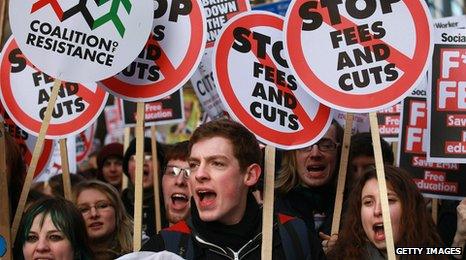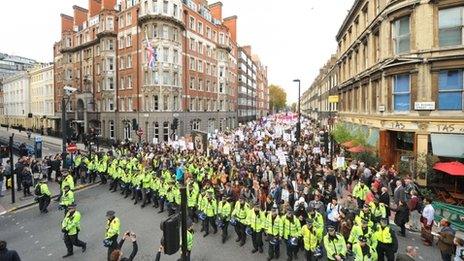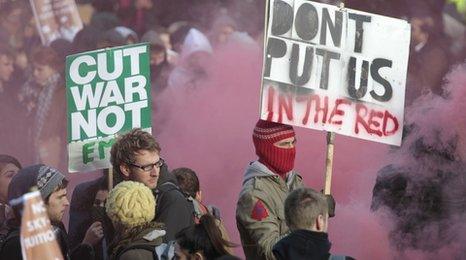Why are students and others protesting in London?
- Published

The students are just one group protesting in London on Wednesday
About 10,000 people are expected to join a march in London today in a protest about university tuition fees.
After a similar march last year led to violence, police say they have permission to use rubber bullets in extreme circumstances.
Black cab drivers, electricians, plumbers and engineers are also planning demonstrations in the capital on Wednesday.
More than 4,000 officers will be on the streets to police the various protests.
What exactly are the students protesting about?
They are unhappy about the government's plan to allow universities to increase tuition fees from the current maximum of £3,290 per year to a maximum of £9,000 a year for students starting in September 2012.
With many universities saying they plan to charge the maximum - or close to it - the average degree is expected to rise to about £8,500 a year.
Many people are worried it will land students with massive debts that will take years to pay off.
They also say that it will put people off from going to university in the first place, particularly if they are not very well off.
The government thinks the move will increase competition among universities and raise standards.
It also thinks it's fair that students should pay more for their education and get less help from taxpayers because of the higher salaries they eventually receive.
They say it's still good value in the long run.
Where are the students going to march to?
Protesters will meet near the University College London campus in Bloomsbury, central London, before heading to Trafalgar Square and Holborn, and ending near the Barbican.
They are also due to pass close to St Paul's Cathedral, where other protesters have set up tents in recent weeks to demonstrate about the so-called 'greed' of big companies.
Why are construction workers protesting?
Electricians, plumbers and engineers claim that a group of construction companies are forcing pay-cuts and 'de-skilling' on workers.
Recent months have seen protests at building sites across the UK, including Sellafield in Cumbria, Grangemouth and Ratcliffe power stations and Blackfriars and King's Cross railway stations in London.
Today they'll march from Blackfriars to the Houses of Parliament.
The union Unite claims workers have been threatened with the sack if they don't sign up to new agreements and says eight of nine workers will lose a third of their wages as a result.
It's planning to organise a vote of its members to see if they want to strike over the issue.
However, others in the construction industry say the claims about pay cuts and sacking are misleading and false.
The Heating and Ventilating Contractors Association says no one will lose money and that the new agreements will even mean 30% of workers will get a pay rise.
It reckons it'll mean more job security and that changes in the UK construction industry are needed to stop firms losing contracts to foreign rivals.
What about the cabbies?
They say their livelihoods are under threat and also have fears about the safety of the industry in London.
Around 2,000 cabbies are expected to drive to Trafalgar Square and clog up the famous landmark in protest.
RMT union boss Mr Crow says its members are unhappy about 'pedicabs' - bicycle taxis, as well as minicabs going against the rules and using their taxi ranks.
Mr Crow says the taxi trade in London is under an "unprecedented attack".
The United Cabbies Group (UCG) also says using taxis at night isn't as safe as it should be, particularly for women, and wants tougher checks on who gets a minicab licence.
A plan for a special VIP traffic lane during the Olympics is another reason for the protest.
Cabbies won't be allowed to use the lane and they say it'll mean slower journeys, traffic jams and frustrated passengers.
- Published9 November 2011

- Published9 November 2011

- Published10 December 2010

- Published25 November 2010
